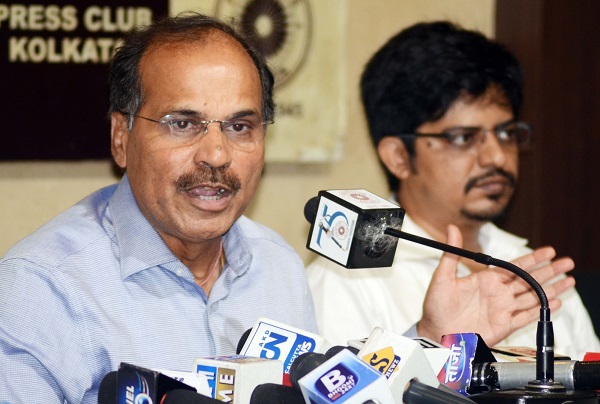Kolkata, Maverick, aggressive, and controversial, five-time MP Adhir Ranjan Chowdhury has for long been considered the strongman of West Bengal’s Murshidabad district, where he kept the Congress flag flying for decades, and won against all odds from Baharampur in the recent Lok Sabha polls.
The win came despite the Trinamool Congress making deep inroads in the district and Chowdhury’s bete noire – state Chief Minister Mamata Banerjee – going all out to ensure his defeat. Chowdhury triumphed with a 80,000 plus margin over the Trinamool candidate, becoming only one of the two successful Congress candidates from the state.
Known as a street fighter and a man of indomitable spirit, Chowdhury, 63, has a Robin Hood-like image in Murshidabad, where he was implicated in a number of criminal cases, but also earned praise for carrying out widespread development and ensuring safety of women as chairman of the Baharampur municipality in the 1990s.
Born on April 2, 1956 in Baharampur, Chowdhury has had a colourful political journey, beginning with a stint with the Maoist movement in the mid-1970s, which landed him in jail for the first time.
According to Revolutionary Socialist Party state Secretary Kshiti Goswami, after the CPI-M-led Left Front came to power, Chowdhury had a stint with the Marxist Forward Bloc before crossing over to his party – both LF partners.
“It was in the 1980s that he became a disciple of one of our councillors in Baharampur, Swapan Chatterjee and joined our fold. However, after some time, he had strong differences with the party, while our leaders also ignored him. It was then that he joined forces with the CPI-M labour arm CITU for a short while, but did not get the political footing he wanted,” Goswami told IANS.
Chowdhury switched allegiance to the Congress, which fielded him from the Nabagram assembly constituency in 1991. According to reports, the election saw a 300-strong party of CPI-M supporters chasing Chowdhury into a booth and its candidate holding the presiding officer hostage with a securityman’s service revolver.
He lost by small margin, but his organising ability, muscle power and tough posture against the then dominant CPI-M made him popular among Congress workers in Murshidabad.
He was jailed in connection with the murder of a CPI-M leader’s relative, but won from Nabagram – while behind the bars – in 1996 with a margin of over 20,000 votes. Old-timers recalled that his speeches were recorded from prison and played at campaign meetings.
Interestingly, Mamata Banerjee had stiffly opposed his candidature, and gone to the extent of dramatically wrapping herself with a black shawl and likening it to a noose in public.
In 1999, Chowdhury – a Hindu Kayastha – made his maiden entry into the Lok Sabha from Baharampur, from where he has never lost till date.
Chowdhury was instrumental in persuading then Congress stalwart Pranab Mukherjee, often derided till that time as a “rootless wanderer” for his inability to win direct elections, to successfully contest for the Lok Sabha from minority-dominated Murshidbad district’s Jangipur in 2004 and 2009.
In late 2005, Chowdhury again spent over a month in prison on a double murder charge, but such was his popularity that when he came out, over 6,000 Congress supporters, as also top state leaders gave him a hero’s welcome outside the jail premises.
Chowdhury, who has studied up to the intermediate level, became the Minister of State for Railways in October 2012, during the UPA-2 regime under Prime Minister Manmohan Singh.
On February 10, 2014, he was appointed President of the West Bengal Pradesh Congress, a post he held till September 21 last year. Under him, the Congress tied up with its one-time arch rival Left Front for the 2016 assembly polls. The combine campaigned hard, and drew large crowds at public meetings, but ultimately the Trinamool Congress triumphed with a to-thirds margin.
Though by no means an orator, Chowdhury is a forceful speaker both inside and outside Parliament, and caught the eye of the Congress high command with is sharp attacks on Narendra Modi government on various occasions.
But the speech which gave Chowdhury the maximum mileage, was his fierce assault on the Banerjee-led Trinamool in Parliament last year with regard to the Saradha and Narada scams.
In a party where loyalty to the high command – read Gandhi family – is regarded as the chief criterion for upward mobility, Chowdhury remains a notable exception.
Time and again he has gone against the wishes of the high command, and pitted, backed and ensured the victory of rebel candidates. A Congressman recalled how he once jointly addressed an election rally with then Congress President Sonia Gandhi, and from the venue, directly drove to the polls meeting of a rebel candidate.
Chowdhury remains an enigma. And there perhaps lies the magic of his appeal, which has endeared him to the Congress high command, which recognised his seniority to anoint him its leader in Lok Sabha at a time when the grand old party is going through one of its lowest ebbs in its 133-year-long history.










